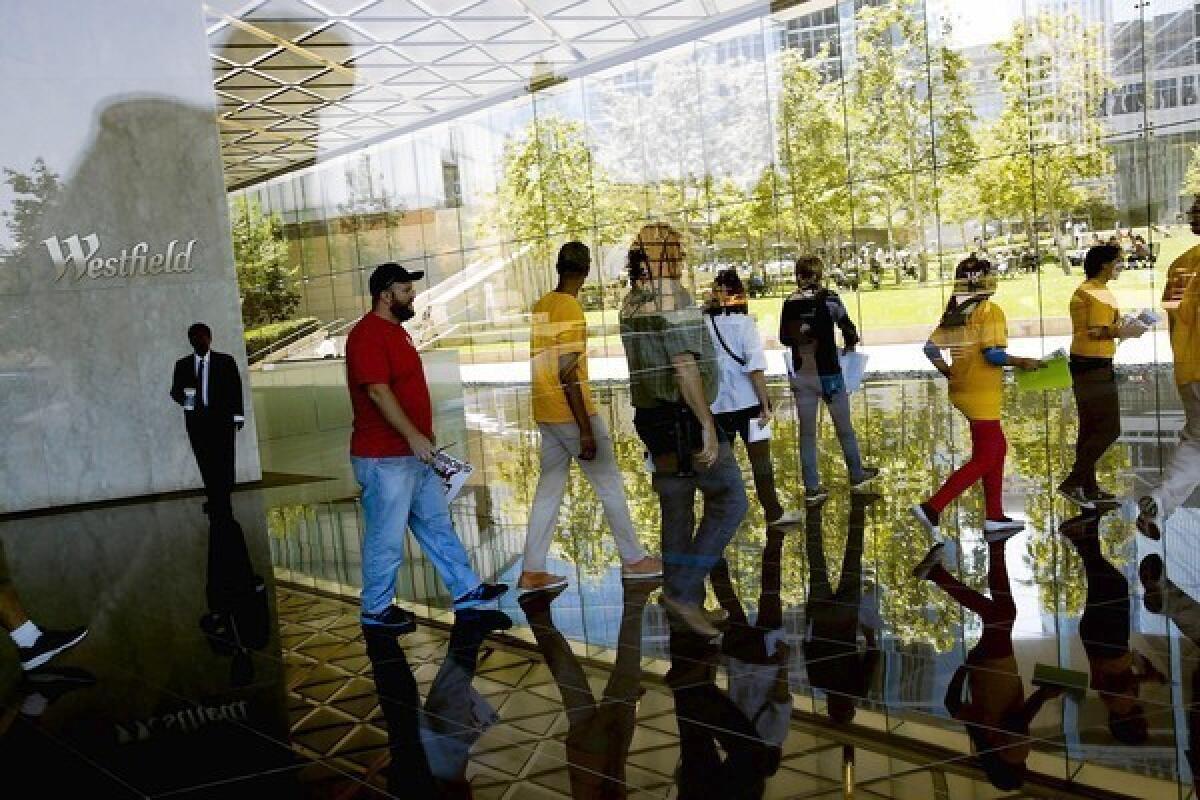Unions target Westfield malls over Prop. 13 tax benefits

- Share via
Labor groups are targeting one of Los Angeles’ most prominent real estate operations, mall giant Westfield, in a new campaign to highlight business property tax breaks tied to Proposition 13.
A group of unions and anti-poverty organizations calling itself the ReFund LA Coalition launched a campaign last week against Australia-based Westfield Group, which they say has benefited from harmful tax policy established by the 35-year-old tax limiting initiative. The company has mall properties around the world and is among the largest retail property owners in Los Angeles County.
The coalition wants commercial property owners like Westfield to pay more property taxes, which have been held down for both business and homeowners by Proposition 13 since 1978.
Lowell Goodman, a spokesman with Service Employees International Union Local 721, which represents thousands of Los Angeles city and county employees, said Westfield was picked as an initial target because of the company’s high profile.
“Westfield is the first of many examples that will be exposed in an effort to make sure that California’s property tax system is fair to the communities,” he said in an email.
The landmark Proposition 13 initiative, which limits the amount that a property’s assessed value can rise each year, was promoted as necessary to prevent homeowners from being driven from their homes by rising tax bills. But critics have long argued that businesses received too much in tax breaks, harming the ability of state and local governments to raise revenues for needed projects and services.
Activists staged a protest at the Westfield Century City mall Thursday and released a report claiming the company is “underpaying” property taxes by $41 million a year in California, including $18.7 million in Los Angeles County.
Westfield spokeswoman Katy Dickey said in an emailed response that “Westfield pays its property taxes as assessed by the county and in accordance with California law, just like everyone else.”
The coalition’s report, written by the Australian union United Voice — which has had labor disputes with Westfield — cited differences in property values Westfield reported to shareholders and the properties’ far lower official assessed values. On average, the report said, Westfield was taxed on less than two-thirds of the properties’ market value as reported to shareholders. The discrepancy is largely a result of Proposition 13.
David Kline, a spokesman for the California Taxpayers Assn., said the campaign is simply a new iteration of a long-running battle over the tax law.
“The government employees have been advocating for a split roll property tax system since 1978,” he said, referring to proposals to treat commercial and residential property differently. “The voters and property owners of all kinds have rejected the idea time and time again because it’s just a bad system.”
In addition to the tax break afforded by Proposition 13, property owners can file appeals of their property valuations to get tax bills lowered. The union report did not analyze any Westfield appeals, and Los Angeles County officials could not quickly provide details on any cases involving the company.
Dickey said the company contests property tax assessments “from time to time when we believe they are not appropriate” and has a current appeal pending on property in Valencia.
Separately, Westfield recently won a tax break from the Los Angeles City Council, which voted in June to allow the company to keep up to $59 million in new net tax revenue over a 25-year period from a planned shopping mall and hotel in Warner Center. Proponents said the tax deal will speed up the project, create jobs and bring the city new tax revenue in the long run. Opponents argued it was a tax giveaway.
Times staff writers Jack Dolan and Maloy Moore contributed to this report.
More to Read
Sign up for Essential California
The most important California stories and recommendations in your inbox every morning.
You may occasionally receive promotional content from the Los Angeles Times.














